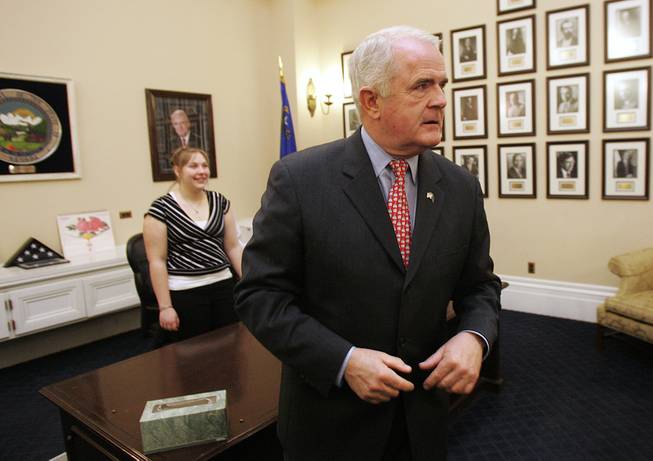
Governor Jim Gibbons heads into his office on the first day of the special legislative session Tuesday, Feb. 23, 2010 in Carson City.
Wednesday, Feb. 24, 2010 | 2 a.m.
In Today's Sun
Reader poll
Sun Coverage
- Gibbons pulls senior staff from legislative hearings (2-23-10)
- Gibbons denies, then admits taking texting friend to D.C. (2-23-10)
- Lawmakers to tackle water rights during special session (2-23-10)
- Proposal to close state prison meets opposition (2-23-10)
- Budget crunchtime: Lawmakers set to tackle historic deficit (2-23-10)
Sun Coverage
New Taxes to Balance the Budget?
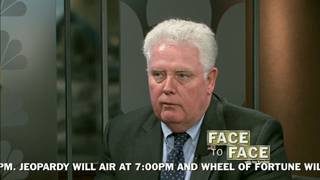
Viewing video requires the latest version of Adobe's Flash Player
Gov. Jim Gibbons’ shifting budget plan is complicating his re-election bid, tarnishing his conservative credentials and eroding support among the Republican base.
By proposing reduced tax deductions for the mining industry and a number of fee increases for some state agencies to help close Nevada’s $887 million budget gap, Gibbons has opened himself to claims of hypocrisy on the campaign trail. As the Legislature prepped for this week’s special session, Democrats and Republicans alike questioned the governor’s proposals, with legislative leaders accusing Gibbons of being inconsistent on his anti-tax stance.
For Gibbons, who has railed against Democrats for raising taxes, that message could inflict damage as his political fortunes seem to be on the rebound. After months of abysmal approval ratings, a new statewide poll by Republican pollster Glen Bolger this week found Gibbons gaining ground on GOP front-runner Brian Sandoval.
In 2006, Gibbons made a campaign pledge not to raise taxes or fees — and upholding that pledge has been the core plank to his campaign platform. Now, his proposed mining tax and fee increases muddle his re-election argument.
Sandoval, who has a reputation as a moderate, is using Gibbons’ proposals to gain conservative ground. On Monday, he sent out a fundraising appeal billing himself as the only candidate in the race with a plan to fix the fiscal crisis without raising taxes.
“Raising taxes on an already shrinking tax base is not the solution,” Sandoval wrote. “We cannot tax our way back to prosperity.”
The influential conservative group Americans for Tax Reform wrote letters to legislators this week, asking them to oppose what it called Gibbons’ “massive tax increase” on mining. The group had been accusing the governor of violating its anti-tax pledge, which Gibbons has signed.
The political fallout for the governor was clear over the weekend on the Lincoln Day dinner circuit in rural Nevada, a crucial part of Gibbons’ base. Republican crowds in mining communities objected to Gibbons’ proposal to strip the industry of some tax deductions. In Battle Mountain, a party official shouted down Gibbons’ surrogate in the middle of his campaign speech.
The surrogate, university system Regent Ron Knecht, revised Gibbons’ message: The governor may have proposed new taxes — but not nearly as many as he expects from the Democratic-controlled Legislature.
The attempt to draw a nuanced contrast on revenue increases is emerging as a key theme in the special session.
On Monday, Gibbons submitted a revised budget plan to the Legislature, remaining firm on the mining tax but removing some fee increases such as on birth and death certificates and restaurant health inspections.
In a meeting of the Interim Finance Committee, Assembly Speaker Barbara Buckley, D-Las Vegas, accused Gibbons of “reacting to the political slam of the day,” citing the rural reaction to his mining proposals.
“The governor gets beat up on the campaign trail and all of a sudden we see fees removed,” she said.
Democrats had supported the fees to mitigate further cuts in education and health and human services. Senate Minority Leader Bill Raggio, R-Reno, also questioned why Gibbons had reversed himself on the fees.
Robin Reedy, Gibbons’ chief of staff, attempted to cut off the line of questioning.
“The governor has pretty much made his case on where he stands on fees and taxes,” she said, calling legislators’ questions “a frustrating waste of time.”
An angry Raggio fired back: “If you are looking at me, you are not going to tell me what kind of questions to ask.”
“I’m not looking at you,” Reedy said.
Reedy told lawmakers the changes to Gibbons’ budget plan were not political. She argued he has been consistent because the affected parties agreed to the increases.
The tense questioning continued Tuesday, with Senate Majority Leader Steven Horsford, D-Las Vegas, asking budget director Andrew Clinger why the governor deemed some increases — on veterans home residents and children’s health care — acceptable, while others — on restaurants to cover the expense of inspections — were not.
Clinger echoed Reedy, saying that in some instances, such as the veterans fee increase, the groups affected by it supported it.
“Are you saying that children, or the parents of children looking to purchase health care through the state, support a 300 percent increase in the fees?” Horsford said.
Tuesday evening, Gibbons sent staff to remove Clinger and Health and Human Services Director Mike Willden from the legislative hearings because he objected to the tone of the questions, spokesman Dan Burns said.
“How many days, how many hours do we have to spend listening to this?” Burns said. “It’s laughable. It gets to the point where they’re just verbally berating hardworking state employees.”
Burns explained the changes in Gibbons’ proposals: “As we drilled down, and looked at each one, we made the decision. At this time, it’s the wrong time to ask anyone to pay more.”
Increases in health insurance premiums for 12,000 poor families whose children are covered by Nevada Check Up are needed because of higher state costs, Burns said.
Taxpayer groups criticized Gibbons last year for including a hotel room tax increase in the budget he submitted to the Legislature. Gibbons defended the move, saying voters in Clark and Washoe counties had approved the increase in an advisory ballot question. In a move that critics described as an attempt to have it both ways, Gibbons allowed the room tax increase to become law without his signature.
Gibbons’ campaign is avoiding nuance though, arguing in a fundraising letter that the governor has kept his promise not to raise taxes. The letter also criticized Democrats — and both parties’ gubernatorial candidates — for failing to offer alternative budget plans.
Rural legislators said they were reserving judgment on Gibbons’ proposals until they see more details.
Sen. Mike McGinness, R-Fallon, said Gibbons had honored his anti-tax pledge and enjoys widespread support in rural Nevada. Still, he acknowledged the semantic line being drawn between taxes and fees, saying some of Gibbons’ proposed fees were “kind of fuzzy.”
“I don’t think it’s hurting him now, but this is far from soup yet,” Assemblyman Pete Goicoechea, R-Eureka, said. “If he comes forward and takes away mining deductions, then you have to say it’s a tax increase. I think the rurals are waiting for the other shoe to drop.”
Sun reporter David McGrath Schwartz contributed to this story.
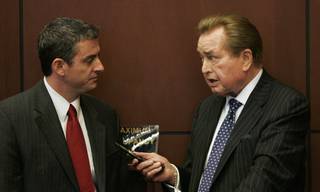
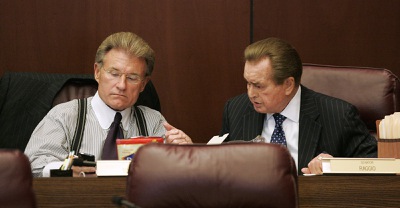
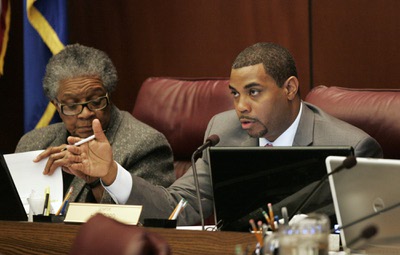

Join the Discussion:
Check this out for a full explanation of our conversion to the LiveFyre commenting system and instructions on how to sign up for an account.
Full comments policy